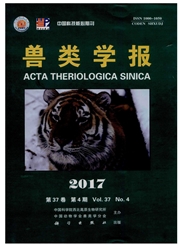

 中文摘要:
中文摘要:
湖北后河国家级自然保护区,地处华中腹地,属武陵山东段余脉的一部分山地。该区域生物多样性高,但近15年来未对该地区的自然资源进行过全面调查。为深入了解该区域野生动物多样性现状及其变化,于2012年7月29日至2014年1月8日,在后河自然保护区设置红外相机监测位点53个,对保护区内的兽类和鸟类进行调查。红外相机共拍到鸟兽的独立有效照片1 963张。经鉴定,可以辨认的兽类共计4目12科19种;鸟类共计4目7科29种。在兽类中,野猪(Sus scrofa),毛冠鹿(Elaphodus cephalophus),中华斑羚(Naemorhedus griseus)的相对丰富度指数较高;在鸟类中,红腹锦鸡(Chrysolophus pictus),红腹角雉(Tragopan temminckii)的相对丰富度指数较高。其中,黑熊(Ursus thibetanus),猕猴(Macaca mulatta),中华鬣羚(Capricornis milneedwardsii),中华斑羚,红腹锦鸡,红腹角雉,松雀鹰(Accipiter virgatus)等为国家Ⅱ级重点保护动物;红腿长吻松鼠(Dremomys pyrrhomerus),岩松鼠(Sciurotamias davidianus),小麂(Muntiacus reevesi),宝兴歌鸫(Turdus mupinensis),棕噪鹛(Garrulax poecilorhynchus),橙翅噪鹛(Garrulax elliotii)等为中国特有种。本文为今后后河自然保护区野生动物组成、种群动态、活动节律、生境利用、保育等长期监测工作以及后续科学研究建立基础。
 英文摘要:
英文摘要:
The Houhe National Nature Reserve (HNNR), located in central China, is part of the eastern Wuling Mountains and is rich in biodiversity. Aside from a natural resource survey conducted in 1997, however, no comprehensive survey has thus far been conducted for the diversity of mammal and bird species. To address this deficiency, we set up 53 camera traps in HNNR from July 29th, 2012 to January 8th, 2013. A total of 1963 independent valid photos were taken of the target species, representing 4 orders, 12 families and 19 species of mammal, and 4 orders, 7 families and 29 species of birds. According to the relative abundance indices, the wild boar (Sus scrofa), tufted deer (Elaphodus cephalophus) and Chinese goral (Naemorhedus griseus) predominated among mammals. Among birds, the highest relative abundance indices were for the golden pheasant ( Chrysolophus pictus) and Chinese tragopan ( Tragopan temminckii). The survey detected several rare animals under second-class state protection, i. e. the Asian black bear (Ursus thibetanus), rhesus monkey (Macaca mulatta), Chinese serow (Capricornis milneedwardsii) , Chinese goral, golden pheasant, Chinese tragopan and besra (Accipiter virgatus). The survey also detected several Chinese endemic animals, i.e. the red-hipped squirrel (Dre- morays pyrrhomerus), P~re David's rock squirrel (Sciurotamias davidianus), Reeves' muntjac (Muntiacus reevesi), Chi- nese thrush ( Turdus mupinensis) , rusty laughingthrush ( Garrulax poecilorhynehus) and Elliot' s laughingthrush ( Garrulax elliotii). Our findings provide the foundation for future research on ecological community composition, population dynam- ics, niche diversification, activity rhythms and habitat use, which will under-score subsequent long-term conservation moni- toring in HNNR.
 同期刊论文项目
同期刊论文项目
 同项目期刊论文
同项目期刊论文
 期刊信息
期刊信息
